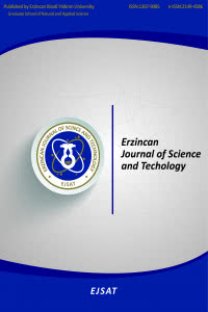Friction Behavior of TiAlN, AlTiN and AlCrN Multilayer Coatings at Nanoscale
Amonton Yasasi, Elastik Modulü, Fiziksel Buharlaştirma ile Biriktirme, Sürtünme Kuvveti Mikroskopisi, Yüzey Enerjisi
Friction Behavior of TiAlN, AlTiN and AlCrN Multilayer Coatings at Nanoscale
Amonton’s Law, Elastic Modulus, Friction Force Microscopy, Physical Vapor Deposition (Pvd), Surface Energy,
___
- Asay, D.B., Kima, S.H. 2006. Direct force balance method for atomic force microscopy lateral force calibration. Review of Scientific Instruments, 77, 043903.
- Badisch, E., Roy, M. 2013. Surface Engineering for Enchanged Performance against Wear, Springer, London.
- Bhushan, B. 1999. Principles and Applications of Tribology.
- Bhushan, B. 2001. Principles of tribology, Modern tribology handbook, Volume 1, CRC Press, New York.
- Bhushan, B., Israelachvili, J.N., Landman, U. 1995. Nanotribology: friction, wear and lubrication at the atomic scale, Nature, 374, 607-616.
- Buckley, D.H. 1981. Surface effects in adhesion, friction, wear, and lubrication, Tribology Series 5, Elsevier, 247-249.
- Chu, S., Majumdar, A. 2012. Opportunities and challenges for a sustainable energy future, Nature, 488, 294-303.
- Holmberg, K., Andersson, P., Erdemir, A. 2012. Global energy consumption due to friction in passenger cars, Tribology International, 47, 221-234.
- Holscher, H., Schirmeisen, A., Schwarz, U. D. 2008. Principles of atomic friction: from sticking atoms to superlubric sliding, Philosophical Transactions. Series A, Mathematical, Physical, and Engineering Sciences, 366, 1383–1404.
- Israelachvili, J.B., Chen, Y.L., Yoshizawa, H. 1994. Relationship between adhesion and friction forces, Journal of Adhesion Science and Technology, 8 (11), 1231-1249.
- Lauda, P. 2007. Applications of thin coatings in automotive industry, Journal of Achievements in Materials and Manufacturing Engineering, 24, 51- 56.
- Liew, W.Y.H., Jie, J.L.L., Yan, L.Y., Dayou, J., Sipaut, C.S., Madlan, M.F.B. 2013. Frictional and wear behavior of AlCrN, TiN, TiAlN single layer coatings, and TiAlN/AlCrN, AlN/TiN nano-multilayer coatings in dry sliding, Procedia Engineering, 68, 512-517.
- Manini, N., Mistura, G., Paolicelli, G., Tosatti, E., Vanossi, A. 2017. Current trends in the physics of nanoscale friction, Advances in Physics: X, 2 (3), 569-590.
- Mo, J.L., Zhu, M.H. 2009. Tribological oxidation behavior of PVD hard coatings, Tribology International, 42, 1758-1764.
- Mo, J.L., Zhu, M.H., Lei, B., Leng, Y.X., Huang, N. 2007. Comparison of tribological behaviors of AlCrN and TiAlN coatings-Deposited by physical vapor deposition, Wear, 263, 1423-1429.
- Mo, Y., Turner, K.T., Szlufarska, I. 2009. Friction laws at the nanoscale, Nature, 457, 1116-1119.
- Otsuki, M., Matsukawa, H. 2013. Systematic Breakdown of Amontons’ Law of Friction for an Elastic Object Locally Obeying Amonton’s Law, Scientific Reports, 3, 1586.
- Rosen, B.G., Ohlsson, R., Thomas, T.R. 1996. Wear of cylinder bore microtopography, Wear, 198, 271-279.
- Ruan, J.A., Bhushan, B. 1993. Atomic-Scale Friction Measurements Using Friction Force Microscopy: Part I—General Principles and New Measurement Techniques, Journal of Tribology, 116(2), 378-388.
- Sang, Y., Dubé, M., Grant, M. 2008. Dependence of friction on roughness, velocity, and temperature, Physical Review E, 77, 036123.
- Spijker, P., Anciaux, G., Molinari, J.F. 2013. Relations between roughness, temperature and dry sliding friction at the atomic scale, Tribology International, 59, 222–229.
- Stachowiak, G. W., Batchelor, A. W. 2000. Engineering tribology, Butterworth-Heinemann, 1-9.
- Svahn, F., Rudolphi, A.K., Wallén, E. 2003. The influence of surface roughness on friction and wear of machine element coatings, Wear, 254, 1092–1098.
- Xu, Q., Jensen, K.E., Boltyanskiy, R., Sarfati, R., Style, R.W., Dufresne, E.R. 2017. Direct measurement of strain-dependent solid surface stress, Nature Communications, 8 (555), 1-6.
- Yang, J., Komvopoulos, K.A. 2005. Molecular Dynamics Analysis of Surface Interference and Tip Shape and Size Effects, on Atomic-Scale Friction, Journal Tribology, 127(3), 513-521.
- Zhang, S.W. and Lan, H.Q. 2002. Developments in tribological research on ultrathin films, Tribology International, 35(5), 321-327.
- ISSN: 1307-9085
- Yayın Aralığı: Yılda 3 Sayı
- Başlangıç: 2008
- Yayıncı: Erzincan Binali Yıldırım Üniversitesi, Fen Bilimleri Enstitüsü
İsmet ULUSU, Demet YILMAZ, Zeynep UZUNOĞLU, Yunus AKALTUN
Yeni Yapılması Planlanan bir Kavşağın Mikro-Simülasyon ile Değerlendirilmesi
Halim Ferit BAYATA, Osman Ünsal BAYRAK
Yüksek Hızlı Demiryolları, Gelişme Eğilimleri, Hizmet Parametreleri Üzerine Bir Derleme
Mehmet Fatih ALTAN, Mehmet Çağrı KIZILTAŞ
Bitki Çaylarında Mikrobiyal Kalite ve Mikotoksin Varlığı
Nuray CAN, Serap DURAKLI VELİOĞLU
Sütsüz Dağı (Antalya) ve Çevresinin Endemik Bitkileri ve Tehlike Kategorileri
Hakkı DEMİRELMA, Yavuz BAĞCI, Hüseyin DURAL, Kuddisi ERTUĞRUL
Terapötik Moleküllerin Aktarımında Kullanılan Yeni Nesil Biyomalzemeler
Ayşenur PAMUKCI, Hüseyin PORTAKAL, Erdal EROĞLU
Trombidiid (Acari: Trombidiidae) Akarlar Tarafından Parazitlenen Konakçılar
